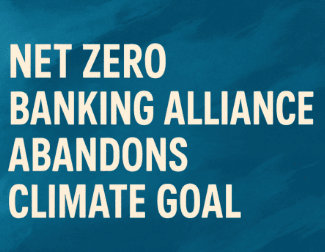
Net-Zero Banking Alliance Loosens 1.5°C Alignment Rule Amid Political Pressure

Background
The Net-Zero Banking Alliance (NZBA), an UN-convened coalition of banks committed to climate action under the Paris Agreement, has revised its framework in response to growing political and regulatory pressures, particularly from the United States.
Since its launch in 2021 with 43 members, the NZBA grew rapidly to over 140 banks representing $74 trillion in assets. However, several major U.S. and Canadian banks exited in recent months due to rising political scrutiny around ESG-aligned commitments. As of now, membership stands at 128 banks representing $47 trillion.
Key Developments
1. Policy Shift:
NZBA has removed the mandatory requirement for member banks to align lending and capital markets activities with limiting global warming to 1.5°C.
2. Language Softened:
The original 2024 guidelines required banks to set a mandatory 2050 target aligned with 1.5°C, on a comply-or-explain basis. The revised guidelines now merely “recommend” setting a net-zero target aligned with the Paris Agreement.
3. Reason for Change:
NZBA cited a “new external reality,” especially political and legal risks for banks in climate alliances. The move is intended to help banks focus on client engagement and market-based decarbonization strategies.
The Net-Zero Banking Alliance (NZBA) cited a rapidly changing external environment as a key reason for loosening its climate alignment requirement which are:
1. Political Pressure
In the U.S., some politicians, especially from the Republican Party, are strongly against climate-focused financial groups. They believe banks that try to avoid funding fossil fuel companies are being "unfair" to those industries.
- Some U.S. states passed laws that punish banks for joining climate groups like NZBA.
- These laws ban those banks from doing business with the state, like managing public money or helping raise funds.
Because of this pressure, many big U.S. banks left NZBA. Staying in the group could hurt their business in certain states.
2. Legal Risk
Some U.S. politicians also warned that joining groups like NZBA might break the law, by making it seem like banks are working together to block certain industries (like coal or oil). Banks are worried they could be sued or investigated.
3. Conflicting Rules Across Countries
- In Europe, governments are supporting strong climate action.
- In the U.S., some governments are punishing it.
So, international banks are stuck between two different sets of expectations and that creates risk.
How Did NZBA Respond?
To deal with all this:
i. NZBA made its rules less strict,
ii. Gave members more freedom to follow their own climate plans,
iii. And focused on helping banks work with clients instead of setting hard climate limits.
Implications of key developments
· Banks now have greater flexibility in setting climate targets, potentially slowing the pace of sector-wide decarbonization.
· Softened standards may raise concerns about the credibility of voluntary climate alliances.
· The alliance is pivoting toward enabling member banks to align their own strategies with decarbonization opportunities rather than enforcing uniform targets.
Looking Ahead
The NZBA’s changes reflect the delicate balance between advancing climate goals and responding to evolving political and regulatory dynamics. The move may shape how other voluntary ESG alliances recalibrate in the face of global scrutiny.
More News
ESG Frameworks and Why They Matter: A Rating Provider’s Perspective
An in-depth overview of key global and regulatory ESG frameworks, explaining how...
UK Proposes Regulation of ESG Ratings to Strengthen Market Trust
The UK proposes formal regulation of ESG rating providers to address transparenc...
Double Materiality Assessment and its Significance
This blog explains the concept of Double Materiality Assessment and why it is be...
How Independent Reviews Enhance Investor Confidence in ESG Debt Markets
SEBI’s 2025 ESG debt framework marks a new phase for India’s sustainable fin...
GHG Protocol x ISO: A New Partnership to Align Global Carbon Accounting
A major shift in corporate climate reporting is underway as the GHG Protocol and...


